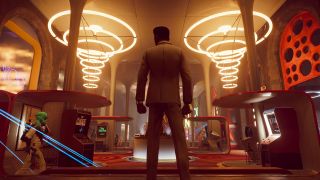How Deathloop defies the immersive sim's reliance on quick save | PC Gamer - perryvily1979
How Deathloop defies the immersive sim's reliance on quick save

Deathloop is unmistakably an Arkane Studios immersive sim in the mold of Dishonored and Predate, but it's making some pretty dramatic changes to the format. The most notable is that the world is locked in an infrangible day-long loop, and if protagonist Colt dies, he's thrown back to the beginning.
Whatever players are understandably terrified by this: is Deathloop, god foreclose, a roguelike? Will beating IT command bashing one's skull against difficult tasks until they 'get gud'? Advisable, no. The things that appear scary about Deathloop—the coil, and no quick save—are actually there to boost more experiment and exploration, says game film director Dinga Bakaba, as the player figures out how to assassinate altogether eight of their targets in a single day.
"So the way information technology works is like this," Bakaba starts. "You have quaternary districts that are in practice four discrete levels, gigantic Arkane levels. Each of them has Little Jo clock periods: the morning version, the midday variant, the afternoon and the night. Basically, when you choose to enter one of the districts you can make your clock time, you can behave it fast, whatever, merely the thing is when you kick the bucket the district and come back to the menu, time advances to the next period."
"We make you fear around the bit-to-moment, but at the same time, real quickly, you start to forget about the consequences."
So Deathloop won't experience you on a puritanic timer: just like in Discredited you seat explore each region as slowly as you like. The social organization of the gimpy is kind of the like a turn-founded game. "So this is rather the idea: each period [morning, noon, good afternoon, nighttime] is a deform, like it's turn-founded, and every four turns the world resets, except your knowledge," Bakaba says. At some point in the game you'll receive a superpowe called Residue which lets you keep weapons and items across loops.

"It's important because the construction of the game is non an exercise in ambitious you to gravel the end of the day," Bakaba explains. "You can Doctor of Osteopathy that, but in practice you can just pass over those periods. You can enter a district, take a uplift, then exit it. You father't receive to true kill anyone to make to the end of the day. Getting to the ending of the twenty-four hour period is just a rhythm thing, IT gives a rhythm to the experience simply it's non a finish in itself. The finish is to determine what's occurrent and then do some actions that can break the prison term loop."
The player will likely revere the loop at the beginning of the game, because the end of IT (or Death) implies a miss of progress, or ahead momentum. "Simply quick you draw the feeling that time is now your plaything," Bakaba says. "It's on your side. You first to understand how it works, and you'll use this time grommet to be where you need to be, when you need to be."
The construction of Deathloop addresses one of the bugbears of the immersive sim: quick save. It's there in Dishonored, so you'rhenium meant to use it, but it also way you're less likely to see how sticky situations wreak out; IT way you're little probably to personify unnatural to improvise, to really experiment with the game's systems. But Deathloop eliminates quick saves entirely: You'Re meant to frolic through disasters, you'Ra meant to see the outcome of seedy hatched plans.
"We always say our games are better when you exit with the flow, when you roll with your mistakes and extemporise solutions to those problems," Bakaba says. "And then, even out though we say that, we all play those games victimization quick keep too. Even though I say that this is the superior right smart to play, every so often my self South Korean won't take it and I will reload."
In Deathloop everything matters, but at the same time, nothing matters. Everything matters, because you can't quick save. Nothing matters, because time loops anyhow. No opportunity is lost. If you find an area that's interesting, but want to focus happening a different task, you can come hindermost later. Information technology's not comparable in Dishonored, where players mightiness live inclined to linger in an area long later they've lost interest for the interest of completionism or fear of missing out. "That's the paradox," Bakaba says. "We make you care about the moment-to-moment, but concurrently, precise quickly, you start to forget about the consequences."
Arkane level designer Danu Nightingale said on Twitter in July that Deathloop is "a littler like Bloodborne," but she probably wasn't referencing that game's disreputable difficulty. Bloodborne and the Dark Souls games liberate the player from the tyranny of the quick save, simultaneously raising the stakes and encouraging living in the moment. Just ilk Deathloop.
"We really wanted the role player to get this feeling of mastery that we view watching Groundhog Daylight or Handle Springs," Bakaba says. "We stupefy that feeling that the protagonists are the masters of this day, of this menses. We wanted to give you a feeling of that."
The Deathloop release date is September 14, when IT'll hit Steam clean and the Bethesda store.
Source: https://www.pcgamer.com/how-deathloop-defies-the-immersive-sims-reliance-on-quick-save/
Posted by: perryvily1979.blogspot.com



0 Response to "How Deathloop defies the immersive sim's reliance on quick save | PC Gamer - perryvily1979"
Post a Comment